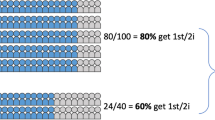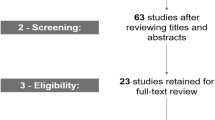Abstract
This article combines Bourdieu’s concepts of field, habitus and cultural capital with Lyotard’s account of performativity to construct a three-tiered framework in order to explore how managerialism has affected the academic habitus. Specifically, this article examines the adoption of group assignments as a means of developing teamwork skills in one Australian case study organisation. On a macrolevel, by viewing the employability imperative as one manifestation of managerialism in the higher education field, we argue that managerialism has created a performative culture in the case study organisation evidenced by an increasing emphasis on performance indicators. On a mesolevel, by examining how academics use group assessments to respond to demands made by governments and employers for ‘employable graduates’, we highlight the continuity of academic habitus. Finally, on a microlevel by drawing on alumni reflections regarding their experiences of group assessments at university, we are able to shed some light on their evaluation of this pedagogical tool.
Similar content being viewed by others
References
Aaltio, I., & Heilmann, P. (2009). Case study as a methodological approach. In A. J. Mills, G. Durepos, & E. Wiebe (Eds.), Encyclopaedia of case study research (pp. 67–78). London: Sage.
Alvesson, M., & Spicer, A. (2016). (Un)conditional surrender? Why do professionals willingly comply with managerialism. Journal of Organizational Change, 29(1), 29–45.
Anderson, G. (2008). Mapping academic resistance in the managerial university. Organization, 15(2), 251–270.
Barnett, R., & Coate, K. (2005). Engaging the curriculum in higher education. The Society for Research in higher education. Berkshire: Open University Press.
Barrie, S. C. (2004). A research-based approach to generic graduate attributes policy. Higher Education Research & Development, 23(3), 261–275.
Blackmore, J., & Sachs, J. (2003). ‘Zealotry or nostalgic regret’? Women leaders in technical and further education in Australia: agents of change, entrepreneurial educators or corporate citizens? Gender Work and Organisation, 10(4), 478–503.
Bloland, H. G. (1995). Postmodernism and higher education. The Journal of Higher Education, 66(5), 521–559.
Bourdieu, P. (2005). The social structures of economy. Cambridge: Polity Press.
Bourdieu, P. (1996). The state nobility: elite schools in the field of power. Cambridge: Polity Press.
Bourdieu P (1986) The forms of capital. In Richardson JE (ed) Handbook of theory of research for the sociology of education. Greenword Press, 241–258.
Bourdieu, P., & Wacquant, L. J. (1992). An invitation to reflexive sociology. Chicago: University of Chicago Press.
Brown, P., & Scase, R. (1994). Higher education and corporate realities: class, culture, and the decline of graduate careers. London: UCL Press.
Burnes, B., Wend, P., & By, R. T. (2014). The changing face of English universities: reinventing collegiality for the twenty-first century. Stud High Educ, 39(6), 905–926.
Clarke, J., & Newman. J., (1997). The managerial state: power, politics and ideology in the remaking of social welfare. London: SAGE.
Dent, M., & Whitehead, S. (2002). Introduction: configuring the new professional. In M. Dent & S. Whitehead (Eds.), Managing professional identities: knowledge, performativity and the new professional (pp. 1–16). London: Routledge.
Eriksson, P., & Kovalainen, A. (2010). Case study research in business and management. In A. J. Mills, G. Durepos, & E. Wiebe (Eds.), Encyclopedia of case study research (pp. 93–97). Thousand Oaks, CA: Sage.
Flyvbjerg, B. (2006). Five misunderstandings about case-study research. Qual Inq, 12(2), 219–245.
Gallagher M (2001) Lifelong learning: demand and supply issues—some questions for research. The Business/Higher Education Roundtable Conference on The Critical Importance of Lifelong Learning. Canberra: Department of Education, Training and Youth Affairs.
Harley, S., & Lee, F. S. (1997). Research selectivity, managerialism, and the academic labor process: the future of nonmainstream economics in UK universities. Human Relations, 50(11), 1427–1460.
Hyslop-Marginson, E., & Sears, A. M. (2006). Neo-liberalism, globalization and human capital learning. Springer.
Jary, D. (2002). Aspects of the audit society: issues arising from the colonization of professional academic identities by a ‘portable management tool’. In M. Dent & S. Whitehead (Eds.), Managing professional identities: knowledge, performativity and the new professional (pp. 38–60). London: Routledge.
Johnson, D., & Johnson, R. T. (1975). Learning together and alone: cooperation, competition and individualisation. Englewood Cliffs: Prentice Hall.
Kelley, C., Tong, P., & Choi, B.-J. (2010). A review of assessment of student learning programs at AACSB schools: a dean’s perspective. J Educ Bus, 85(5), 299–306.
Knights, D., & Clarke, C. A. (2014). It’s a bittersweet symphony, this life: fragile academic selves and insecure identities at work. Organ Stud, 35(3), 335–357.
Lamont, M., & Lareau, A. (1988). Cultural capital: allusions, gaps and glissandos in recent theoretical developments. Sociological Theory, 6(2), 153–168.
Lareau, A., & Weininger, E. B. (2003). Cultural capital in educational research: a critical assessment. Theory and Society, 32(5/6), 567–606.
Leathwood, C., & Read, B. (2013). Research policy and academic performativity: compliance, contestation and complicity. Stud High Educ, 38(8), 1162–1174.
Lozano, J. F. (2012). Educating responsible managers: the role of university ethos. Journal of academic ethics, 10(3), 213–226.
Lyotard, J. F. (1984). The post-modern condition: a report on knowledge. Manchester: Manchester University Press.
Maton, K. (2008). Habitus. In M. Grenfell (Ed.), Pierre Bourdieu: key concepts (pp. 49–66). Acumen: Durham.
Morley, L. (2003). Quality and power in higher education. Society for Research into higher education. Berkshire: Open University Press.
Nickson, A. (2014). A qualitative case study exploring the nature of new managerialism in UK higher education and its impact on individual academics’ experience of doing research. Journal of Research Administration, 45(1), 47–69.
Nossal, G. (1997). The future of our universities: economic rationalism or irrationality? Aust Univ Rev, 40(2), 10–12.
O’Byrne, D., & Bond, C. (2014). Back to the future: the idea of a university revisited. Journal of Higher Education Policy and Management, 36(6), 571–584.
O’Reilly, D., & Reed, M. (2011). The grit in the oyster: professionalism, managerialism and leaderism as discourses of UK public services modernization. Organ Stud, 32(8), 1079–1101.
Parker, M. (2002). The romance of lonely ‘dissent’: intellectuals, professionals and the McUniversity. In M. Dent & S. Whitehead (Eds.), Managing professional identities: knowledge, performativity and the new professional (pp. 138–156). London: Routledge.
Pfeffer, J., & Fong, C. T. (2002). The end of business schools? Less success than meets the eye. Academy of Management Learning & Education, 1(1), 78–95.
Prichard, C., & Willmott, H. (1997). Just how managed is the McUniversity? Craig Prichard, Hugh Willmott. Organ Stud, 18(2), 287–316.
Reay, D. (2004). ‘It’s all becoming habitus’: beyond the habitual use of habitus in educational research. Br J Sociol Educ, 25(4), 431–444.
Rubin, R. S., & Martell, K. (2009). Assessment and accreditation in business schools. In S. J. Armstrong & C. V. Fukami (Eds.), The sage handbook of management learning, education and development. London, Thousand Oaks, New Delhi, Singapore: SAGE Publications.
Slaughter, S., & Leslie, L. L. (1997). Academic capitalism. Baltimore: Johns Hopkins University Press.
Stake, R. E. (1995). The art of case study research. Thousand Oaks, London and New Delhi: Sage.
Willcoxson, L., Wynder, M., & Laing, G. K. (2010). A whole-of-program approach to the development of generic and professional skills in a university accounting program. Acc Educ, 19(1–2), 65–91.
Wilton, N. (2011). Do employability skills really matter in the UK labour market? The case of business and management graduates. Work Employ Soc, 25(1), 85–100.
Yin, R. K. (2003). Case study research: Design and Methods. Third Edition: London, Thousand Oaks, New Delhi and Singapore: SAGE Publications.
Ylijoki, O. H., & Ursin, J. (2013). The construction of academic identity in the changes of Finnish higher education. Stud High Educ, 38(8), 1135–1149.
Author information
Authors and Affiliations
Corresponding author
Rights and permissions
About this article
Cite this article
Kalfa, S., Taksa, L. Employability, managerialism, and performativity in higher education: a relational perspective. High Educ 74, 687–699 (2017). https://doi.org/10.1007/s10734-016-0072-2
Published:
Issue Date:
DOI: https://doi.org/10.1007/s10734-016-0072-2




